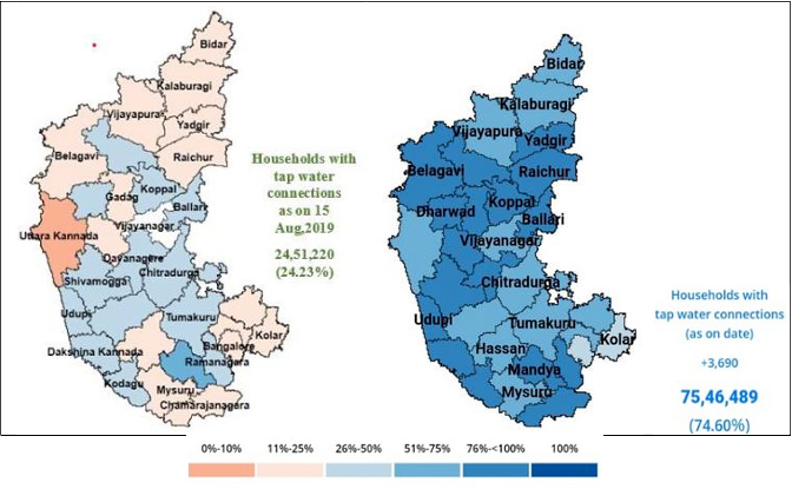
Geographical analysis
Department of Geography & GIS

Department of Geography & GIS

Geographical analysis
DOI: 10.53989/bu.ga.v13i1.sowmya
Year: 2024, Volume: 13, Issue: 1, Pages: 30-34
Original Article
K L Sowmyashree1∗, B Chandrashekara2
1 Guest Lecturer, DOS in Geography, University of Mysore, Mysore
2 Professor, DOS in Geography, MGM, University of Mysore, Mysore
*Corresponding author email: [email protected]
Received Date:12 March 2024, Accepted Date:18 May 2024
Access to clean and safe water is essential for human well-being and socio-economic progress. The Jal Jeevan Mission (JJM), initiated by the Government of India in 2019, aims to ensure Functional Household Tap Connections (FHTCs) for all rural households by 2024. In Karnataka, a state with a substantial rural populace, JJM plays a pivotal role in alleviating water scarcity and enhancing water accessibility. This study assesses the implementation of JJM in Karnataka, with a focus on the distribution of tap water connections across districts. By scrutinizing data on tap water coverage, the research identifies disparities in access and investigates factors contributing to varying levels of implementation success. The Ordinary Least Squares (OLS) method is employed to discern the divergence between estimated and actual tap water connections. Initial findings indicate that districts like Gadag, Dharwad, and Chamarajanagara demonstrate higher proportions of tap water connections, likely attributed to prioritized resource allocation, early implementation, infrastructure development, community involvement, and strategic planning. However, further inquiry is necessary to comprehensively understand the nuanced factors shaping implementation outcomes. The analysis using the OLS method reveals that in Northern Karnataka, the actual number of tap water connections surpasses the estimated value, suggesting effective implementation efforts. Conversely, in southern and coastal districts, while the estimated tap water connections are high, the actual performance falls short of the estimation, posing a significant challenge for the JJM slated for completion by December 2024. Hence, policymakers and scholars must address this disparity to achieve the target of 100% tap water connections in Karnataka.
© 2024 Sowmyashree & Chandrashekara. This is an open-access article distributed under the terms of the Creative Commons Attribution License, which permits unrestricted use, distribution, and reproduction in any medium, provided the original author and source are credited.
Published By Bangalore University, Bengaluru, Karnataka
Subscribe now for latest articles and news.